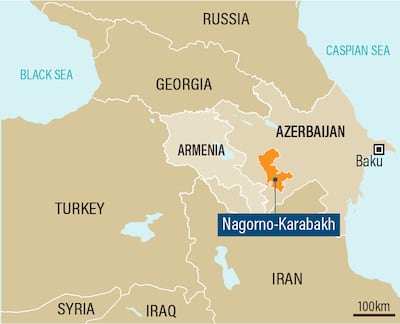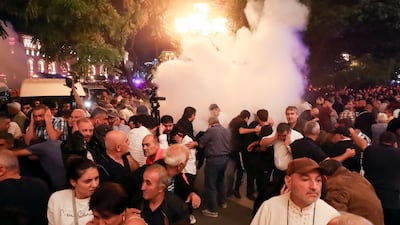Separatist Armenian forces in Nagorno-Karabakh agreed to the terms of a Russian-proposed ceasefire on Wednesday, a day after Azerbaijani troops launched an “anti-terrorist” operation in the region.
Azerbaijan fired heavy artillery at Armenian positions, killing and wounding dozens of people as explosions rocked parts of the area before the ceasefire.
Azerbaijan's Defence Ministry on Wednesday announced an agreement had been reached.
It said Armenian forces in Karabakh agreed to "lay down their weapons, abandon combat positions and military posts and completely disarm", and all weapons and heavy equipment were being handed over to the Azerbaijan army.
“Through the mediation of the command of the Russian peacekeeping contingent stationed in Nagorno-Karabakh, an agreement was reached on the complete cessation of hostilities from 1pm on September 20,” the region's self-proclaimed presidency said.
However, an analyst told The National the rapid capitulation by Armenia’s government could severely undermine the leadership of Prime Minister Nikol Pashinyan.
“There is definitely scope for a groundswell of unrest which will seriously threaten the stability of Pashinyan’s government,” said Alex Lord, Russia expert at the Sibylline intelligence company.

“This settlement,could well destabilise the government with many citizens calling for the resignation or even impeachment of Pashinyan,” he added. “There is growing anger in Armenia that the government has effectively abandoned Nagorno-Karabakh especially given the shock of such rapid military defeat.”
He said Mr Pashinyan’s “express order” for Armenian forces not to fight “very much underscored the military superiority of Azerbaijan forces”.
There were also “key questions” around the longer-termstatus of the ethnic Armenian population that will remain in Nagorno-Karabakh and over whether the ceasefire will hold.
Vladimir Putin, the Russian President, said it was talking to the protagonists, as he met China's Foreign Minister Wang Yi.
Mr Putin said Moscow was expecting to achieve a peaceful settlement of the situation in Karabakh and Russian peacekeepers were doing everything to protect civilians.
As Azerbaijan on Wednesday announced it had halted its military operation, the autonomous authorities in the enclave, which dates from the collapse of the Soviet Union, said the deal, reached through negotiations, envisions the withdrawal of Armenian military units and equipment from Nagorno-Karabakh.
On Tuesday, UN Secretary General António Guterres called “for an immediate end to the fighting” after the EU, France and Germany condemned Azerbaijan's military action.
It came as a former senior official in Nagorno-Karabakh's ethnic Armenian administration said about 100 people had been killed and hundreds injured.
More than 7,000 people have been evacuated from 16 communities, separatists in the region have said.
The artillery fire raised concerns that a full-scale war in the region could resume between Azerbaijan and Armenia, which for more than three decades have been locked in a struggle over Nagorno-Karabakh.
The most recent heavy fighting there occurred over six weeks in 2020.
Karabakh is recognised internationally as part of Azerbaijan, which rejects accusations that its aim is to ethnically cleanse the region.
The country said it will protect the rights of the area's ethnic Armenian civilians under its own constitution.
It says it is determined, however, to remove the breakaway region's political and military structures.
Armenian Prime Minister Nikol Pashinyan said officials from Yerevan, the capital, did not take part in drafting the truce agreement between separatists in Nagorno-Karabakh and Azerbaijan, in an address to the nation on Wednesday.
Nonetheless the rapid capitulation by Armenia’s government could severely undermine the leadership of Prime Minister Pashinyan, a leading analyst told The National.
“There is definitely scope for a groundswell of unrest which will seriously threaten the stability of Pashinyan’s government,” said Alex Lord, Russia expert at the Sibylline intelligence company.
“This settlement could well destabilise the government with many citizens calling for the resignation or even impeachment of Pashinyan,” he added. “There is growing anger in Armenia that the government has effectively abandoned Nagorno-Karabakh especially given the shock of such rapid military defeat.”
He said Mr Pashinyan’s “express order” for Armenian forces not to fight “very much underscored the military superiority of Azerbaijan forces”.
There were also “key questions” around the longer-term status of the ethnic Armenian population that will remain in Nagorno-Karabakh and over whether the ceasefire will hold.
Ethnic Armenians in Karabakh blame Azerbaijan for starting the offensive against the 120,000 people living in an area they consider their homeland.
Calls for calm
Another war in the former Soviet Union could disrupt the geopolitical balance in the South Caucasus, an area where Russia, the US, Turkey and Iran are competing for influence.
Armenians in Karabakh, which they call Artsakh, said the fighting had been intense in places.
Azerbaijan said its intention was to “disarm and secure the withdrawal of formations of Armenia's armed forces from our territories, [and] neutralise their military infrastructure”.
As the Soviet Union crumbled, what is known as the First Karabakh War broke out between Armenians and Azerbaijan, from 1988 to 1994. About 30,000 people were killed and more than a million displaced.
The Second Karabakh War
In 2020, after decades of skirmishes, Azerbaijan began a military operation that became known as the Second Karabakh War, breaking through Armenian defences.
Azerbaijan, backed by Turkey, scored a resounding victory in the 44-day conflict, taking control of parts of Karabakh. Russia brokered a ceasefire at the time.
But Armenia has accused Moscow of being too distracted by its own war in Ukraine to protect it and said Russian peacekeepers in Karabakh were failing to act.
Protesters chanted anti-Russian slogans outside the Russian embassy in Armenia on Tuesday evening, Russia's state Tass news agency reported.
“We should not allow some people, some forces, external and internal, to put Armenia's statehood under attack,” Mr Pashinyan said in a national address on Tuesday.
“I have to record that, as expected, calls for a coup are already being heard from different places, even in Armenia.”

